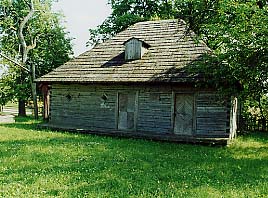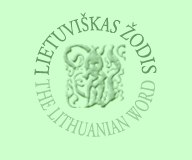 Kazimieras
JAUNIUS (1849-1908), famous self-taught Lithuanian linguist, born
in Lembas, county of Taurage, on May 6, 1849. He studied at the
Theological Seminary of Kaunas from 1871 -75 and at the Theological
Academy of St. Petersburg from 1875-79, earning a master's degree in
theology. Appointed professor of Latin and Lithuanian at the Kaunas
Theological Seminary in 1880, he was also expected to teach several
theological subjects, and served as secretary to the bishop of
Samogitia. His preoccupation with the study of language caused him to
neglect his priestly duties, resulting in a discharge from his
position at the seminary. Unable to mend relations with his
ecclesiastical superiors, he went as pastor
Kazimieras
JAUNIUS (1849-1908), famous self-taught Lithuanian linguist, born
in Lembas, county of Taurage, on May 6, 1849. He studied at the
Theological Seminary of Kaunas from 1871 -75 and at the Theological
Academy of St. Petersburg from 1875-79, earning a master's degree in
theology. Appointed professor of Latin and Lithuanian at the Kaunas
Theological Seminary in 1880, he was also expected to teach several
theological subjects, and served as secretary to the bishop of
Samogitia. His preoccupation with the study of language caused him to
neglect his priestly duties, resulting in a discharge from his
position at the seminary. Unable to mend relations with his
ecclesiastical superiors, he went as pastor
to Kazan', Russia, in 1893. Five years later he was offered a
professorship at the Theological Academy of St. Petersburg, where he
taught Latin, Greek and Hebrew until 1906. Severe illness forced him
to relinquish his teaching position and culminated in his death on
Feb. 25,1908 in St. Petersburg. He was buried at the cemetery of
Kaunas.
- As a linguist, Jaunius was
self-educated, never having systematically studied the subject in
school. In virtue of his excellent memory and keen ability for
languages, he learned a multitude of them and knew Latin, Greek and
Hebrew particularly well. What preoccupied him above all else was an
attempt to show how different linguistic forms actually evolved from a
common, original or basic form. When expounding linguistic matters, he
projected a sense of total, passionate involvement with his subject,
fascinating his audience not only with the flair and elegance of his
rhetoric but also with the immense scope of his factual
knowledge. These qualities guaranteed his reputation among foreign
scholars, many of whom regarded him as a great authority on the
Lithuanian language and as an inexhaustible source of reliable
information. J. Baudouin de Courtenay, the famous Polish linguist,
held Jaunius to be singularly gifted; the University of Cracow
attempted to secure him as professor in 1903. The well-known German
linguist K. Brugmann paid Jaunius a visit in 'order to confer on
professional matters; F. Delitzsch sought his opinion. The University
of Kazan awarded him an honorary doctor's degree, and the Russian
academicians F. Fortunatov and A. I Shakhmatov were concerned to see
that Jaunius teachings should not go unrecorded.
- Jaunius himself did not show any great
desire to have the results of his research preserved in writing. In
1903 Kazimieras Buga (q.v.) was assigned to him as secretary and
eventually prepared a thorough exposition of Jaunius doctrine in six
volumes, although only one of these was published in 1908 under the
title of AistiSki studijai (Baltic Studies) because Buga soon
became convinced that Jaunius' doctrine contained many serious errors.
The unpublished manuscripts are preserved in the library of the
University of Vilnius. The purely theoretical aspects of these works
are indeed vitiated by Jaunius' disregard for even elementary
principles of linguistic science; however, scholars continue to make
use of the factual, observational material collected in great
abundance and accurately
described.
- An important contribution is his Lietuviu
kalbos gramatika (Lithuanian Grammar), published in 1911 and
translated into Russian by Buga in 1916. The material for it consisted
of lectures given at the Kaunas Theological Seminary from 1885-92.
Notes from these lectures were first reproduced in 1897 by Lithuanian
students at Tartu (Dorpat). Jaunius' grammar is neither comprehensive
nor structurally sound. At first he deals with kinds of orthography,
symbols for marking intonation, and briefly with syntactical
questions; then he turns to a description of Lithuanian dialects,
rules governing intonation, consonants, and inflection
with a great deal 'of attention devoted to the verb. But even though
this grammar is not complete, it contains many important factual data
and examples of historical explication. Jonas Jablonskis (q.v.) called
it a survey of profound linguistic theory and had occasion to make use
of it for his own grammar of Lithuanian. A difficulty accompanying use
of Jaunius' grammar is the overly complicated alphabet he employs, an
alphabet which no one later was able to adopt. On the other hand, his
orthographic principles were taken over by Buga and Jablonskis with
but minor emendations.
- No less valuable are the results of his
inquiry into dialects, a research area for which he showed more
eagerness. Jaunius formulated a number of principles governing sonants
and acunder the title of Aistiski studijai (Baltic Studies)
because Buga soon became convinced that Jaunius' doctrine contained
many serious errors. The unpublished manuscripts are preserved in the
library of the University of Vilnius. The purely theoretical aspects
of these works are indeed vitiated by Jaunius' disregard for even
elementary principles of linguistic science; however,
scholars continue to make use of the factual, observational material
collected in great abundance and accurately described.
- An important contribution is his Lietuviu
kalbos gramatika (Lithuanian Grammar), published in 1911 and
translated into Russian by Buga in 1916. The material for it consisted
of lectures given at the Kaunas Theological Seminary from 1885-92.
Notes from these lectures were first reproduced in 1897 by Lithuanian
students at Tartu (Dorpat). Jaunius' grammar is neither comprehensive
nor structurally sound. At first he deals with kinds of orthography,
symbols for marking intonation, and briefly with syntactical
questions; then he turns to a description of Lithuanian dialects,
rules governing intonation, consonants, and inflection
with a great deal 'of attention devoted to the verb. But even though
this grammar is not complete, it contains many important factual data
and examples of historical explication. Jonas Jablonskis called it a
survey of profound linguistic theory and had occasion to make use of
it for his own grammar of Lithuanian. A difficulty accompanying use of
Jaunius' grammar is the overly complicated alphabet he employs, an
alphabet which no one later was able to adopt. On the other hand, his
orthographic principles were taken over by Buga and Jablonskis with
but minor emendations.
- No less valuable are the results of his
inquiry into dialects, a research area for which he showed more
eagerness. Jaunius formulated a number of principles governing sonants
and ac centological rules, presenting his discoveries in a series of
articles published in Pamiatnaia knizhka Kovenkoi gutiernii,
the yearbook of the Kaunas government. Here are found dialectological
descriptions of the Ukmer-
ge (1891), Kaunas (1892), Raseiniai (1893), Zarasai (1895), and
Panevezys (1898) districts and a study of Lithuanian intonation
(1900). The dialectological classification devised by him and certain
of his principles of accentology are still accepted.
- Jaunius also showed interest in the
evolution 'of the Baltic languages and their relation to Finno-Ugric
tongues;
- he investigated the relation between the
Indo-European and Semitic languages, and was especially interested in
the etymology of individual words. But it is in these latter
investigations, to which he allotted his deepest concentration, that
he also erred the most, mainly because he failed to avail himself of
the historical method of comparative linguistics. Thus, his efforts to
derive semantically similar but phonetically distinct word forms from
one original form were fruitless. His thesis that all languages
evolved from 'one is likewise held to be unfounded. Nevertheless his
preoccupation with such difficult problems attests to his extensive
familiarity with languages and to his ability to perceive deeper
relationships among superficial data. His conclusions were not the
result of following a rigorous, consistent method but more often than
not the outcome of a spontaneous, intuitive insight. In this way he
did manage to solve a number of linguistic problems and to frame many
brilliant hypotheses, which incited other linguists to provide more
substantial evidence.
-
Text from the ENCYCLOPEDIA
LITUANICA I-VI. Boston, 1970-1978

